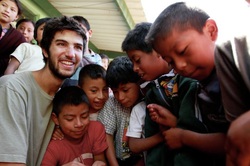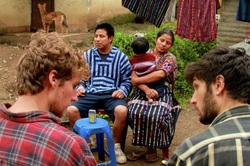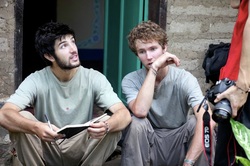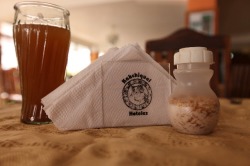
Through our research we have begun to uncover some of the creative ways the poor save money. In an unpredictable world with unreliable income it is hard for many people to save up large sums of money that are necessary to pay for large costs such as weddings or even debt. The poor have very little access to financial tools that we use to generate lump sums such as a pension, loans or an education plan. However, the poor are creative with their money and in many places informal mechanisms have been put together to raise the lump sums they need. We have found this to be true here in Guatemala as well.
Anthony, a twenty four year-old hotel worker was part of a savings group tailored to create the lump sum he needed. The group was a collection of twelve employees that all worked at the same hotel, Hotel Kachiquel. Every month each member gave the organizer of the group Q100. The grand sum of Q1,200 was then given to one of the group members. The order that the money was given out was determined by a random drawing of numbers out of a hat. Each member continued to pay the monthly Q100 until every member had received the lump sum of Q1,200. Once the year cycle was over the savings group disbanded and all of the members were happy to get their single lump sum.
This system of saving is known as a “RoSCA,” or rotating savings and credit association. The authors of Portfolios of the Poor found this system of saving all over the world. There are many variations on this method, each slightly different in structure and use but all serving the purpose of creating useful lump sums. A RoSCA is a great tool because it provides pressure from other members that helps the members to pay on time and eventually provides a lump sum without another organization skimming off a profit on the side. RoSCAs are also custom made to meet the needs of the individual’s cash flow because it is created by the members themselves. However, there are certain limitations with these informal instruments. A well functioning RoSCA can turn sour when a member cannot pay on time. Instead of a large organization taking on the risk, the members themselves are directly affected. If you are one of the last to receive the money then you have to hope the rest of your group don´t lose the incentive to pay their part after they already received their lump sum.
Anthony´s RoSCA worked well because all the members received paychecks at the same time each month from the same hotel where they all worked. However, even in this group we found out that the woman who started it had rigged the system by pretending to pull out the number one, when she really had it in her pocket. She did this so she could pay off a debt that she owed at the time. While this did not hurt the other members it does show how corruption is a reality when there is no reputable institution setting things up.
Microfinance has taken this concept of social pressure to pay for a useful lump sum but instead of providing the lump sum in the middle of the payments it provides it at the beginning. This is the same thing as if Anthony was the first to receive the RoSCA´s payment because in essence he is be paying off a loan with his monthly Q100 installments. While MFI´s do charge interest they are also reliable, cover risk of default and can provide varying sizes of loans that can fit the cost of the individuals need.
Anthony, a twenty four year-old hotel worker was part of a savings group tailored to create the lump sum he needed. The group was a collection of twelve employees that all worked at the same hotel, Hotel Kachiquel. Every month each member gave the organizer of the group Q100. The grand sum of Q1,200 was then given to one of the group members. The order that the money was given out was determined by a random drawing of numbers out of a hat. Each member continued to pay the monthly Q100 until every member had received the lump sum of Q1,200. Once the year cycle was over the savings group disbanded and all of the members were happy to get their single lump sum.
This system of saving is known as a “RoSCA,” or rotating savings and credit association. The authors of Portfolios of the Poor found this system of saving all over the world. There are many variations on this method, each slightly different in structure and use but all serving the purpose of creating useful lump sums. A RoSCA is a great tool because it provides pressure from other members that helps the members to pay on time and eventually provides a lump sum without another organization skimming off a profit on the side. RoSCAs are also custom made to meet the needs of the individual’s cash flow because it is created by the members themselves. However, there are certain limitations with these informal instruments. A well functioning RoSCA can turn sour when a member cannot pay on time. Instead of a large organization taking on the risk, the members themselves are directly affected. If you are one of the last to receive the money then you have to hope the rest of your group don´t lose the incentive to pay their part after they already received their lump sum.
Anthony´s RoSCA worked well because all the members received paychecks at the same time each month from the same hotel where they all worked. However, even in this group we found out that the woman who started it had rigged the system by pretending to pull out the number one, when she really had it in her pocket. She did this so she could pay off a debt that she owed at the time. While this did not hurt the other members it does show how corruption is a reality when there is no reputable institution setting things up.
Microfinance has taken this concept of social pressure to pay for a useful lump sum but instead of providing the lump sum in the middle of the payments it provides it at the beginning. This is the same thing as if Anthony was the first to receive the RoSCA´s payment because in essence he is be paying off a loan with his monthly Q100 installments. While MFI´s do charge interest they are also reliable, cover risk of default and can provide varying sizes of loans that can fit the cost of the individuals need.
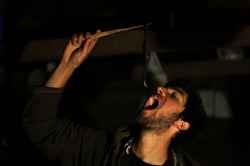
 RSS Feed
RSS Feed
